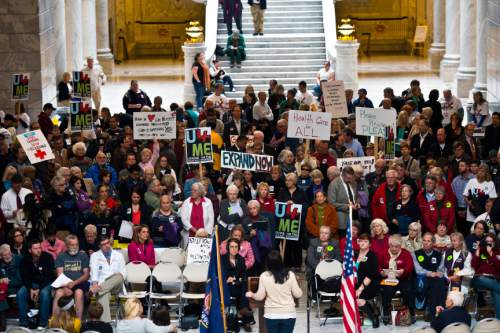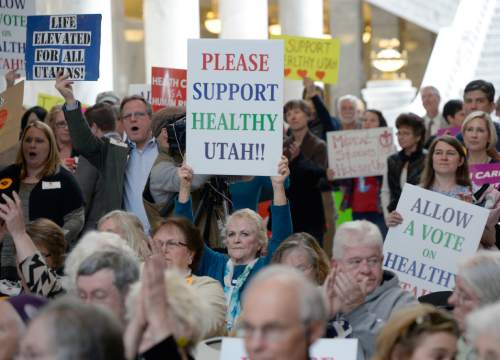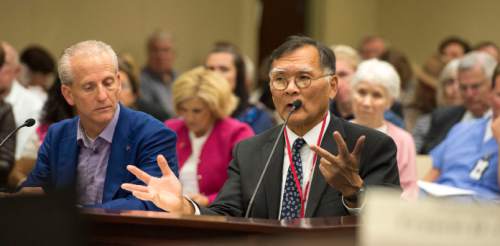This is an archived article that was published on sltrib.com in 2016, and information in the article may be outdated. It is provided only for personal research purposes and may not be reprinted.
After years of fruitless wrangling over whether to expand health coverage to low-income Utahns — and how to pay for it — Utahns still want to see some resolution to the issue and are willing to pay for it, according to a new survey.
However, after repeated attempts to expand Medicaid met with spectacular failures, prospects for a resolution this session remain hazy, and public support appears to be tempered when the cost to taxpayers is considered.
"Some of the guys say, 'I'm tired of talking about it,' '' said Sen. Brian Shiozawa, R-Cottonwood Heights, an emergency room doctor and proponent of Medicaid expansion. ''And I say, 'Well, I am too. But you know what? The problem is not going away.' ''
Gov. Gary Herbert told a group recently that he ''has the scars'' from his long battle to pass Healthy Utah, his preferred plan that would have helped 125,000 Utahns get medical coverage, eventually costing the state $78 million per year and bringing in $450 million in matching federal money.
His plan was soundly defeated in the Republican-controlled House, amid concerns over the cost to the state and fears the federal government may not be able to live up to its end of the bargain. A subsequent version, Utah Access Plus, that was hammered out by Herbert and legislative leaders, suffered an even more embarrassing defeat.
This session the governor is content to let the Legislature try to work out a solution and provide his input along the way.
''I've tried and tried and we've just not been able to get the votes. I understand politics,'' Herbert said during his monthly KUED news conference this week. ''I suspect we'll be working on an alternative to that this legislative session because the issue is still top of the mind for most of us in the state of Utah, for the people and the Legislature. So I'm optimistic we'll find a way.''
But Utah voters want a solution, according to a new poll commissioned by The Salt Lake Tribune and Hinckley Institute of Politics at the University of Utah.
The poll found 44 percent of Utahns support some health care expansion for low-income Utahns, even with a price tag of $78 million.
''It's always easier to say we want to do something if we don't tell people what it's going to cost,'' said House Majority Leader Jim Dunnigan, R-Taylorsville, who has been at the forefront of the health care issue.
Indeed, earlier polls that did not include the cost projections found much broader support, including a Dan Jones & Associates poll conducted for UtahPolicy.com this month that found 70 percent of Utahns supported expanding Medicaid to cover Utah's poor.
The message is still the same, according to RyLee Curtis, a policy analyst with the Utah Health Policy Project, which has supported Medicaid expansion.
''In total, when you look at all of the polls that have been done, the margin might be slim in some polls and large in others,'' she said, ''but it always shows that offering insurance to this low-income population comes out on top and there's always support for that.''
As lawmakers gather Monday to launch the 2016 legislative session, it is anticipated that there will be at least four competing proposals — and possibly more — aimed at expanding Medicaid to cover more of Utah's poor.
• Rep. Ray Ward, R-Bountiful, will propose a plan similar to Herbert's Healthy Utah blueprint, with some minor revisions:
• Shiozawa will introduce legislation to expand Medicaid coverage to those individuals below the poverty line and ask the Obama administration to still pick up 90 percent of the cost. Previously, the White House refused to do that, insisting the state extend coverage for those with incomes up to 138 percent of the poverty level or else settle for the feds paying 70 percent of the cost.
• Dunnigan is proposing a very narrow expansion, covering only the most impoverished Utahns, intended to help the homeless, those with mental or substance-abuse issues and the medically frail. He said his intent is to use the program to gauge how much a broader expansion might cost down the road.
• Sen. Gene Davis, D-Salt Lake City, has a bill that calls for full Medicaid expansion under the existing federal program, a concept the GOP-dominated body has rejected previously.
Shiozawa acknowledges the Obama administration might again refuse to give Utah a full match, but if that happens, the state is not out anything. Other plans that have been floated to cover a smaller population with the federal government paying 70 percent of the cost don't make sense, he said, because they cover fewer people at a greater cost to the state.
''In five years time, if you look at the cumulative effect of any partial expansion, we're looking at hundreds of millions of dollars in additional costs to the state taxpayers,'' he said.
A proposal from the Obama administration to pay all of the costs for Medicaid expansion for another three years — which likely would still need congressional approval — would make the deal even more economical for Utah, Shiozawa said.
The Tribune/Hinckley Institute poll found that older Utahns — those over the age of 50 — were more favorable toward expanding coverage, with half in support, 10 percent higher than those under 50 years old. Fifty-six percent of Republicans opposed broadening Medicaid coverage while only 26 percent supported it. Seventy-one percent of Democrats and nearly half of the independent voters supported expansion.
And the results also cut across economic lines, with nearly half of those making less than $40,000 per year supporting expansion, while 41 percent of those making more than $80,000 backed the idea.
The poll was conducted by SurveyUSA, which used automated calls to survey 989 registered Utah voters on cellphones and land lines. The poll, conducted Jan. 6 through 13, has a margin of error of 3.2 percent.
Twitter: @RobertGehrke







